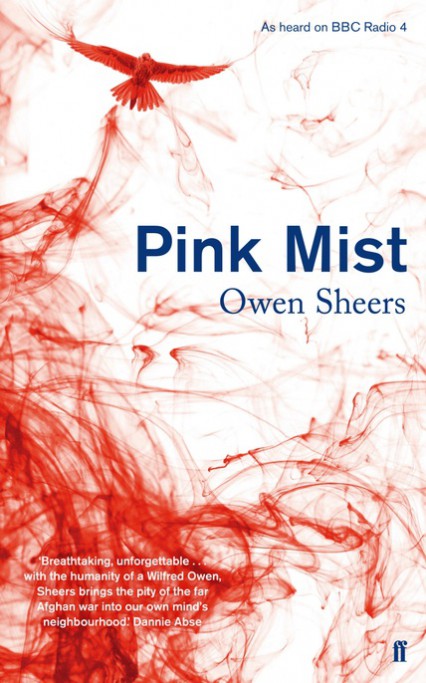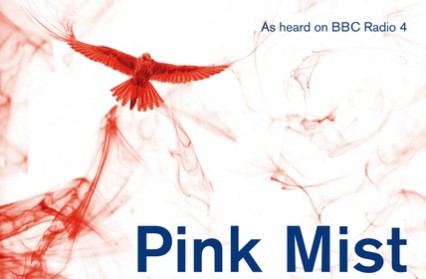Carl Griffin reviews Pink Mist by Owen Sheers, which was originally commissioned for radio arguably better suits a stage than a traditional volume of poetry.

Originally commissioned for radio, Pink Mist, the new book from busy Welshman Owen Sheers, is more suited to the stage than a volume of poetry, and if the poem was simply a poem and not a verse-drama its starkness would be a major criticism.
However, it is the elementary elements of communication, in addition to the realism of all the characters and their plight, which make Pink Mist a memorable read, even when considered solely a poem. The marriage of dialogue and keen observation becomes a delight, not the chore it might otherwise have been.
For readers not familiar with army jargon, the poet, novelist and screenwriter Sheers has included a glossary. Within the poem itself, the pink mist is described as:
When one of your mates hasn’t just bought it,
but goes in a flash, from being there to not.
A direct hit. An IED. An RPG stuck in the gut.
However, it happens you open your eyes
and that’s all they are.
A fine spray of pink, a delicate mist
as if some genie has granted a wish.
There, and then not.
In the late ’90s, three friends in Bristol link arms in a school playground, chanting ‘like fools,/Who wants to play war?‘ In January 2008, Arthur’s answer is ‘us, we want to play war.‘ We meet them on their way to Catterick for basic training, Arthur 19 (presumed), Taff 18, Hads 17, but it is not these crows enduring their drills and punishments which is the focus at the start of this book but their decision to leave their own territory in the first place.
Arthur Brown, the eldest and most influential of the trio, also the story’s narrator, is a dreamer caught by the advertising posters plastered on the walls of the Army Information Centre. Out on the piss one Friday night with his mates, he sees those adverts again, amid the chaos of binge-drinking, pill-popping, pulling, girls ‘more flesh than dress’, and wants something else, sees his own face in place of the soldier’s in the poster, sees himself in the beret and uniform.
The day after this epiphany, Arthur is still battling with the decision to stay or go. Their leaving date hints at a New Year’s resolution, a keenness for self-improvement and moving on up in the world, and the boys’ naivety and innocence as they travel to Catterick adds to the sense of wanderlust, not so much of wanting to go to a specific country but of needing to leave the place with which they are so familiar and so tired of. As Arthur struggles with his decision on an early morning walk, his girlfriend, Gwen, with whom he shares a place in St Paul’s, pops in to share her retrospective reaction to what was going on at that time. Arthur ends up at a bridge where he once saw a stranger jump to his death, launching himself, arms wide, remembering how the man had flown and longs for ‘something in his dive’. Still not convinced about his future plans, he finds himself at a pendulum set in the wall of a church:
A long hollow pipe across the beam of a cross
with water pumped in to make it swing left or right
depending on which way the water is lost.
As good a way as any, that’s what I thought.
So I waited till it swung, then came back into line,
then said to me ‘Left’s the army, to the right’s not.’
After this diatribe, in which Arthur does everything he can to shrug the responsibility of decision-making off his shoulders, Sheers still sees relevance in explaining which way the pendulum fell. Maybe highlighting the accountability of the Army here, and its method of glamorising army life in the hope of luring vulnerable youngsters, would have had its appeal for most writers, but it is to his credit that Sheers shies away from politics. Sheers is never biased in Pink Mist, neither advocate nor aghast. He favours the truth in the stories of people like Arthur and his friends, and that is the book’s overriding strength.
During a night out at the Thekla, a nightclub formed from a former cargo ship, moored in Mud Dock in Bristol’s Floating Harbour, Arthur entices his friends on board, sowing the seed of escapism. During their tour of Afghanistan, the three friends often reflect on this night and how life had been for each of them up until then. Arthur, living with his girlfriend, had worked at Portbury Docks. Hads (Hayden Gullet) had been living with his parents and siblings and had just got a job at Next; he was initially worried about leaving the security of having a job, and Arthur’s immaturity is immortalized in his annoyingly catchy statement: ‘what’s next after Next?’. Taff (Geraint) had been an apprentice plumber in St Paul’s, supporting his wife and son in the high-rise they lived in, dependant on a too lower wage. Up to this point in the poem, some readers may feel as if they have been reading a mediocre short story, for all the perception Sheers treats his audience to. Characters without much depth have conversations and monologues which lack penetration. The language and vocabulary are largely bland, the rhyming random and blunt, and Sheers’ fastidiousness regarding details, or more accurately his obsession with not appearing to be too specific, becomes grating: Someone is aged ‘only twelve, thirteen’ or ’Twenty-two, twenty-three’ and drinks their ‘fourth or fifth cider’. But this straightforwardness is what makes Pink Mist. The characters are believable; readers will relate to them even when they are irksome. The clarity is not a weakness with Sheers but a tool with which he has crafted an eventually stunning poem. But to enjoy Pink Mist for what it means accepting the clichés (which puncture the page like bullet holes puncture a plastic target) and they continue in force as the lads begin their six-month tour of Afghanistan.
Beyond sunburn and revenge killing comes the smell of war. In Taff’s words:
There’s a smell to battle. You learn it.
The certain tang of an RPG.
The dust and grit of an IED.
The bitter scent of your own hot gat.
The oily hint of a machine-gun belt.
The manliness of Pink Mist is interrupted occasionally by the voice of a woman, though one voice is much like another. In addition to Arthur’s girlfriend Gwen, we meet Taff’s wife Lisa and the mother of Hads. All three speak of the change in their partner or family member. An interesting insight into a soldier’s motivation in war-time, rather than the motivation of the army as a whole, is a highlight of Pink Mist’s exploration. The before, during and after of the tour is mixed up in the book, so we don’t learn of the events chronologically but randomly. Right from the off we see the lads’ reaction to rockets on Bonfire Night ‘going up from Clevedon,/dropping their lights like lumies’. In the same way, a clichéd Romcom might make you feel warm and fuzzy inside and pull at your heartstrings, Pink Mist will take you where you have been plenty of times, without introducing any fresh elements, and will never let you get bored. Bristol is alive and kicking here, with its venues and unique colloquialisms, and Afghanistan is booming as it always is, but it is truth, and the guarantee of repetition in our society, which will ensure Owen Sheers’ latest book a place in history.
Pink Mist by Owen Sheers is available now.
Carl Griffin is a regular contributor to Wales Arts Review.
For other articles included in this collection, go here.











